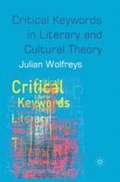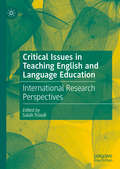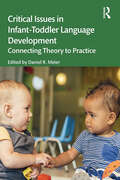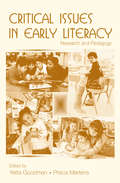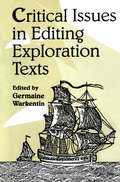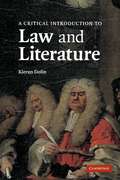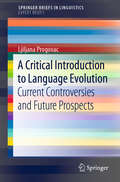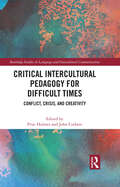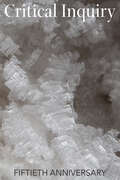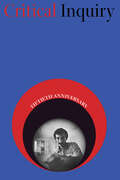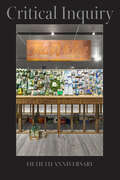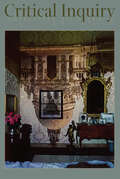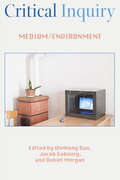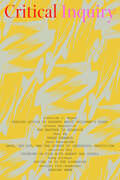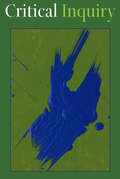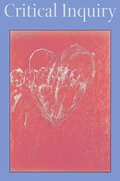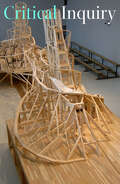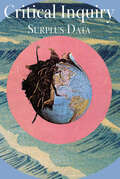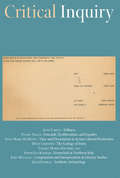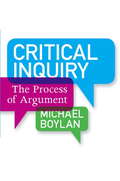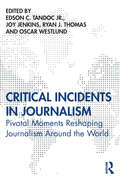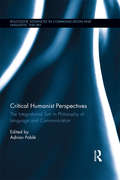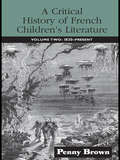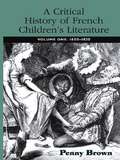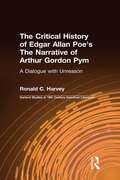- Table View
- List View
Critical Keywords in Literary and Cultural Theory
by Julian WolfreysThis book is an invaluable reference guide for students of literary and cultural studies which introduces over forty of the complex terms, motifs and concepts in literary and cultural theory today. Critical Keywords in Literary and Cultural Theory - gives students a brief introduction to each concept together with short quotations from the work of key thinkers and critics to stimulate discussion and guide genuine comprehension. - supplies helpful glosses and annotations for each term, concept or keyword which is discussed - offers reflective, practical questions at the end of each entry to direct the student to consider a particular aspect of the quotations and the concept they address - provides explanatory notes and bibliographies to aid further research This essential volume is ideal as both a dip-in reference book and a guide to literary theory for practical classroom use.
Critical Issues in Teaching English and Language Education: International Research Perspectives
by Salah TroudiThis edited book brings together a collection of research-based chapters that address a variety of topics related to the teaching of English in different contexts around the world. The chapters are informed by a critical approach to research, employing a variety of research methods to question and problematize taken-for-granted definitions and practices in areas such as classroom pedagogy, testing, curriculum, language policy, the position of English as a medium of instruction, educational management, teacher education, materials and evaluation. This book addresses a major gap in theoretical and research literature in the area of teaching English, and it will be of interest to trainee and practising teachers, research students and scholars of EFL and TESOL, and researchers in applied linguistics.
Critical Issues in Infant-Toddler Language Development: Connecting Theory to Practice
by Daniel R. MeierDesigned to help students and educators make critical theory-to-practice connections, this essential volume provides a deep yet accessible approach to infant and toddler language and literacy education. Centered around four foundational topics—language, interaction, and play; language and culture; multilingualism; and early literacy—each section starts with a chapter breaking down the research and theory, followed by two practice chapters, from both leadership and teacher perspectives, that illustrate key concepts across a range of infant-toddler contexts. Ideal for students in early language and literacy courses as well as programs on infant-toddler development, this critical resource helps readers thoughtfully and practically bring multilingual and multiliterate development to the infant and toddler years.
Critical Issues in Early Literacy: Research and Pedagogy
by Yetta Goodman Prisca MartensThis volume adds in important ways to understanding the power and complexity of the forces in the lives of children that impact their literacy learning. The critical issues presented emerge from interpretivist research and thinking practices that are constructivist in nature. The chapters by researchers, teacher researchers, teacher educators, and teachers are antidotes to the present political context in which political agendas are being used to define literacy, literacy teaching and learning, and literacy research in narrow ways. Providing a rich source of information about how young children come to know reading and writing as a tool of communication in a range of social and cultural contexts, this book:*presents current research and thinking in the field;*documents research that is currently being ignored by many who make decisions about children’s learning;*values who children are and what they bring with them to school;*provides a useful tool for advocacy and for social action toward improving education in ways that can make a difference in the lives of young children; and*raises thoughtful issues for discussion. Critical Issues in Early Literacy is essential reading for early childhood teachers and prospective teachers, for teacher educators, for literacy researchers (including teacher researchers), for special educators, for those working with English-language and foreign-language learners, and for early childhood education administrators, advocates, and policy makers.
Critical Issues Editing Exploration Text
by Germaine WarkentinThe papers in this collection deal with a cultural problem central to the study of the history of exploration: the editing and transmission of the texts in which explorers relate their experiences. The papers chart the transformation of the study of exploration writing from the genres of national epic and scientific reportage to the genre of cultural analysis. As well, they reflect ongoing changes in our ideas about editorial procedures, literary genres, and cultural appropriation.This volume begins with a paper by David Henige, who confronts the classic editorial problems associated with the writings of Christopher Columbus. Luciano Formisano, studying Amerigo Vespucci, illustrates the technical problems associated with transmission. David and Alison Quinn examine Richard Hakluyt's Discourse on Western Planting (1584). I.S. MacLaren investigates the publication, in the nineteenth century, of field notes by Canadian artist Paul Kane. Helen Wallis's paper looks at the institutionalization of 'exploration writing' in the activities of the great publication societies. Finally, in a paper that throws into question assumptions about textuality that would have seemed unassailable three decades ago, James Lockhart examines the textual editing of Nahuatl versions of the conquest of Meso-America.
A Critical Introduction to Law and Literature
by Kieran DolinThis book charts the history of the shifting relations between law and literature, from the Renaissance to contemporary culture and thus provides an accessible guide to one of the most exciting areas of interdisciplinary scholarship today.
A Critical Introduction to Language Evolution: Current Controversies And Future Prospects (Springerbriefs In Linguistics Ser.)
by Ljiljana ProgovacThis book provides a critical introduction to the current views and controversies regarding language evolution. It sheds new light on hot topics such as: How ancient is language? Did Neanderthals have some form of language? Did language evolve gradually and incrementally, through stages, or suddenly, in one leap, in all its complexity? Does language evolution involve natural selection or not? This book is essential reading for scholars and students interested in language evolution, especially those in the fields of linguistics, psychology, biology, anthropology, and neuroscience.
Critical Intercultural Pedagogy for Difficult Times: Conflict, Crisis, and Creativity (Routledge Studies in Language and Intercultural Communication)
by Prue HolmesThis collection lends a critical decolonising lens to intercultural communication research, bringing together perspectives on how forms of education embedded in the arts and humanities can open up intercultural understanding among young people in conditions of conflict and protracted crises. The book draws on case studies from a range of educational contexts in the Global South which engage in creative arts methodologies to foreground decolonising approaches to intercultural communication in which researchers question their own power in the research process. The volume offers intercultural resources that can be used by researchers and community support groups to foster active intercultural communication, dialogue, participation, and responsibility among young people in these settings and those who may be marginalised from them. The collection also highlights the reflexive accounts of researchers working in a transnational, interdisciplinary, and multilingual research network and the subsequent opportunities and challenges of working in such networks. Advocating for intercultural understanding among young people in higher education and a greater focus on social justice in intercultural communication research, this book will be of interest to students and researchers in applied linguistics, language education, intercultural education, and multilingualism.
Critical Inquiry, volume 50 number 3 (Spring 2024)
by Critical InquiryThis is volume 50 issue 3 of Critical Inquiry. Critical Inquiry is a peer-reviewed interdisciplinary journal devoted to the best critical thought in the arts and humanities. Combining a commitment to rigorous scholarship with a vital concern for dialogue and debate, the journal presents articles by eminent and emerging scholars, critics, and artists on a wide variety of issues in contemporary criticism and culture. Associated with no single school of thought, tied to no single discipline, Critical Inquiry is dedicated to providing a forum for cutting-edge thought while reconsidering traditional concepts and practices.
Critical Inquiry, volume 50 number 2 (Winter 2024)
by Critical InquiryThis is volume 50 issue 2 of Critical Inquiry. Critical Inquiry is a peer-reviewed interdisciplinary journal devoted to the best critical thought in the arts and humanities. Combining a commitment to rigorous scholarship with a vital concern for dialogue and debate, the journal presents articles by eminent and emerging scholars, critics, and artists on a wide variety of issues in contemporary criticism and culture. Associated with no single school of thought, tied to no single discipline, Critical Inquiry is dedicated to providing a forum for cutting-edge thought while reconsidering traditional concepts and practices.
Critical Inquiry, volume 50 number 1 (Autumn 2023)
by Critical InquiryThis is volume 50 issue 1 of Critical Inquiry. Critical Inquiry is a peer-reviewed interdisciplinary journal devoted to the best critical thought in the arts and humanities. Combining a commitment to rigorous scholarship with a vital concern for dialogue and debate, the journal presents articles by eminent and emerging scholars, critics, and artists on a wide variety of issues in contemporary criticism and culture. Associated with no single school of thought, tied to no single discipline, Critical Inquiry is dedicated to providing a forum for cutting-edge thought while reconsidering traditional concepts and practices.
Critical Inquiry, volume 49 number 4 (Summer 2023)
by Critical InquiryThis is volume 49 issue 4 of Critical Inquiry. Critical Inquiry is a peer-reviewed interdisciplinary journal devoted to the best critical thought in the arts and humanities. Combining a commitment to rigorous scholarship with a vital concern for dialogue and debate, the journal presents articles by eminent and emerging scholars, critics, and artists on a wide variety of issues in contemporary criticism and culture. Associated with no single school of thought, tied to no single discipline, Critical Inquiry is dedicated to providing a forum for cutting-edge thought while reconsidering traditional concepts and practices.
Critical Inquiry, volume 49 number 3 (Spring 2023)
by Critical InquiryThis is volume 49 issue 3 of Critical Inquiry. Critical Inquiry is a peer-reviewed interdisciplinary journal devoted to the best critical thought in the arts and humanities. Combining a commitment to rigorous scholarship with a vital concern for dialogue and debate, the journal presents articles by eminent and emerging scholars, critics, and artists on a wide variety of issues in contemporary criticism and culture. Associated with no single school of thought, tied to no single discipline, Critical Inquiry is dedicated to providing a forum for cutting-edge thought while reconsidering traditional concepts and practices.
Critical Inquiry, volume 49 number 2 (Winter 2023)
by Critical InquiryThis is volume 49 issue 2 of Critical Inquiry. Critical Inquiry is a peer-reviewed interdisciplinary journal devoted to the best critical thought in the arts and humanities. Combining a commitment to rigorous scholarship with a vital concern for dialogue and debate, the journal presents articles by eminent and emerging scholars, critics, and artists on a wide variety of issues in contemporary criticism and culture. Associated with no single school of thought, tied to no single discipline, Critical Inquiry is dedicated to providing a forum for cutting-edge thought while reconsidering traditional concepts and practices.
Critical Inquiry, volume 49 number 1 (Autumn 2022)
by Critical InquiryThis is volume 49 issue 1 of Critical Inquiry. Critical Inquiry is a peer-reviewed interdisciplinary journal devoted to the best critical thought in the arts and humanities. Combining a commitment to rigorous scholarship with a vital concern for dialogue and debate, the journal presents articles by eminent and emerging scholars, critics, and artists on a wide variety of issues in contemporary criticism and culture. Associated with no single school of thought, tied to no single discipline, Critical Inquiry is dedicated to providing a forum for cutting-edge thought while reconsidering traditional concepts and practices.
Critical Inquiry, volume 48 number 4 (Summer 2022)
by Critical InquiryThis is volume 48 issue 4 of Critical Inquiry. Critical Inquiry is a peer-reviewed interdisciplinary journal devoted to the best critical thought in the arts and humanities. Combining a commitment to rigorous scholarship with a vital concern for dialogue and debate, the journal presents articles by eminent and emerging scholars, critics, and artists on a wide variety of issues in contemporary criticism and culture. Associated with no single school of thought, tied to no single discipline, Critical Inquiry is dedicated to providing a forum for cutting-edge thought while reconsidering traditional concepts and practices.
Critical Inquiry, volume 48 number 3 (Spring 2022)
by Critical InquiryThis is volume 48 issue 3 of Critical Inquiry. Critical Inquiry is a peer-reviewed interdisciplinary journal devoted to the best critical thought in the arts and humanities. Combining a commitment to rigorous scholarship with a vital concern for dialogue and debate, the journal presents articles by eminent and emerging scholars, critics, and artists on a wide variety of issues in contemporary criticism and culture. Associated with no single school of thought, tied to no single discipline, Critical Inquiry is dedicated to providing a forum for cutting-edge thought while reconsidering traditional concepts and practices.
Critical Inquiry, volume 48 number 2 (Winter 2022)
by Critical InquiryThis is volume 48 issue 2 of Critical Inquiry. Critical Inquiry is a peer-reviewed interdisciplinary journal devoted to the best critical thought in the arts and humanities. Combining a commitment to rigorous scholarship with a vital concern for dialogue and debate, the journal presents articles by eminent and emerging scholars, critics, and artists on a wide variety of issues in contemporary criticism and culture. Associated with no single school of thought, tied to no single discipline, Critical Inquiry is dedicated to providing a forum for cutting-edge thought while reconsidering traditional concepts and practices.
Critical Inquiry, volume 48 number 1 (Autumn 2021)
by Critical InquiryThis is volume 48 issue 1 of Critical Inquiry. Critical Inquiry is a peer-reviewed interdisciplinary journal devoted to the best critical thought in the arts and humanities. Combining a commitment to rigorous scholarship with a vital concern for dialogue and debate, the journal presents articles by eminent and emerging scholars, critics, and artists on a wide variety of issues in contemporary criticism and culture. Associated with no single school of thought, tied to no single discipline, Critical Inquiry is dedicated to providing a forum for cutting-edge thought while reconsidering traditional concepts and practices.
Critical Inquiry
by Michael BoylanA succinct handbook on reading and responding critically to argumentative texts, suitable alike for courses in informal logic and the argumentative/persuasive essay. aa
Critical Incidents in Journalism: Pivotal Moments Reshaping Journalism around the World
by Edson C. Tandoc Jr. Joy Jenkins Ryan J. Thomas Oscar WestlundThis edited collection examines critical incidents journalists have faced across different media contexts, exploring how journalists and other key actors negotiate various aspects of their work. Ranging from the Rwandan genocide to the News of the World hacking scandal in the UK, this book defines a critical incident as an event that has led journalists to reconsider their routines, roles, and rules. Combining theoretical and practical analysis, the contributors offer a discussion of the key events that journalists cover, such as political turmoil or natural disasters, as well as events that directly involve and affect journalists. Featuring case studies from countries including Australia, Germany, Brazil, Kenya, and the Philippines, the book explores the discourses that critical events have generated, how journalists and other stakeholders have responded to them, and how they have reshaped (or are reshaping) journalistic norms and practices. The book also proposes a roadmap for studying such pivotal moments in journalism. This one-of-a-kind collection is a valuable resource for students and scholars across journalism studies disciplines, from journalism history, to sociology of news, to digital journalism and political communication.
Critical Humanist Perspectives: The Integrational Turn in Philosophy of Language and Communication (Routledge Advances in Communication and Linguistic Theory)
by Adrian PabléThe present book is a collection of scholarly reflections on the theme of humanism from an integrational linguistic perspective. It studies humanist thought in relation to the philosophy of language and communication underpinning it and considers the question whether being a ‘humanist’ binds one to a particular view of language. The contributions to this volume explore whether integrational linguistics, being informed by a non-mainstream semiology and adopting a lay linguistic perspective, can provide better answers to contentious ontological and epistemological questions concerning the humanist project – questions having to do with the self, reason, authenticity, creativity, free agency, knowledge and human communication. The humanist perspectives adopted by the contributors to this volume are critical insofar as they start from semiological assumptions that challenge received notions within mainstream linguistics, such as the belief that languages are fixed-codes of some kind, that communication serves the purpose of thought transfer, and that languages are prerequisites for communication.
A Critical History of French Children's Literature: Volume Two: 1830-Present (Children's Literature and Culture)
by Penelope E. BrownThis two-volume critical history of French children’s literature from 1600 to the present helps bring awareness of the range, quality, and importance of French children’s literature to a wider audience. The works of a number of French writers, notably La Fontaine, Charles Perrault, Jules Verne, and Saint-Exupéry were, and continue to be, widely translated and adapted, and have influenced the development of the genre in other countries.
A Critical History of French Children's Literature: Volume One: 1600–1830 (Children's Literature and Culture)
by Penelope E. BrownThese books are the first full-length, comprehensive study written in English of French children’s literature. They provide both an overview of developments from the seventeenth century to the present day and detailed discussion of texts that are representative, innovative, or influential best-sellers in their own time and beyond. French children’s literature is little known in the English-speaking world and, apart from a small number of writers and texts, has been relatively neglected in scholarly studies, despite the prominence of the study of children’s literature as a discipline. This project is groundbreaking in its coverage of a wide range of genres, tracing the evolution of children’s books in France from early courtesy books, fables and fairy tales, to eighteenth-century moral tales and educational drama, nineteenth-century novels of domestic realism and adventure stories and contemporary detective fiction and fantasy novels. The discussion traces the relationship between children’s literature and social change, revealing the extent to which children’s books were informed by pedagogical, moral, religious and political agenda and explores the implications of the dual imperatives of instruction and amusement which have underpinned writing for young readers throughout the centuries.
The Critical History of Edgar Allan Poe's The Narrative of Arthur Gordon Pym: A Dialogue with Unreason (Garland Studies in 19th Century American Literature #Vol. 8)
by Ronald C. HarveyFirst published in 1999. Routledge is an imprint of Taylor & Francis, an informa company.
